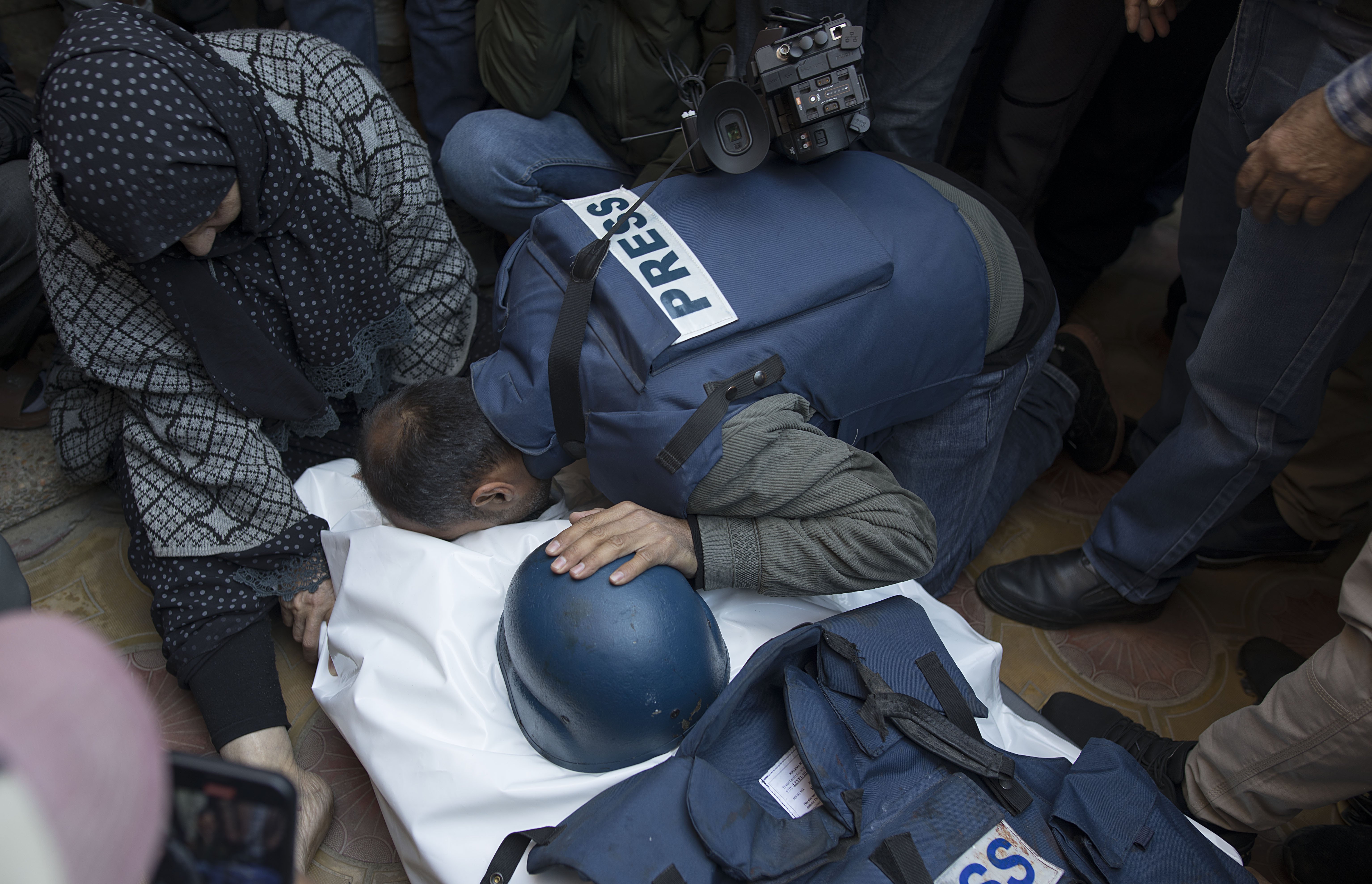The IPI global network is appalled and outraged over the killing of at least five journalists by Israeli air strikes in the span of 24 hours. Amid these killings and new journalistic investigations into previous Israeli military strikes, we urgently renew our call on Israel and the international community to take immediate measures to protect journalists in Gaza and to allow unimpeded access to the strip from international media.
On June 5, an Israeli air strike hit the residence of Saadi Madoukh, director of Deep Shot Media Production Company. The explosion caused the residence to collapse, killing Madoukh and Ahmed Sukkar, a journalist who also worked for Deep Shot. The next day, air strikes on the Nuseirat refugee camp killed journalists Wafa Abu Dabaan, Amjad Jahjouh, and Rizq Abu Shakian. Jahjouh and Abu Dabaan were married. Their child was among the 10 people who were killed in the attack.
Since October 7, the day of the Hamas attack on Israel last year, at least 108 journalists have been killed, making the conflict in Gaza the deadliest modern conflict for journalists on record. The vast majority of those deaths – at least 103 – have been Palestinian journalists killed in IDF air strikes, often while they are at home with their families. Those that survive bombardment report amidst harrowing circumstances, documenting the war in spite of famine, displacement, and immense psychological trauma.
The Israeli military has also bombed media infrastructure in Gaza, including bombing press offices, hitting livestreams, and intermittently cutting off electricity and internet access in the strip. Local journalists, struggling to survive amidst a humanitarian catastrophe, continue to report while facing additional challenges in finding reliable electricity sources to charge their equipment.
Israel continues to impose an information blockade on international journalists in spite of widespread calls from international media outlets to be allowed access. With the exception of a few select trips embedded among IDF forces, no international media sources have been granted access.
Under international law and international humanitarian law, warring parties are legally required to ensure the safety of journalists, as civilians, during times of armed conflict. Any deliberate killing of journalists during armed conflict would amount to a war crime – and must be investigated as such.
The IDF has stated that it does not target the press, claiming killed reporters to be terrorists or unavoidable victims of a war waged in a densely populated area. But The Gaza Project, an enormous collaborative investigation involving 13 news organizations, has revealed extensive evidence that raises doubts about the truth of these claims. The project documented 18 instances of which media workers – some of whom were wearing press vests – were killed in strikes by “surgically accurate” drones easily capable of identifying press vests and filming equipment from a distance.
One drone strike targeted Al Jazeera reporters Samer Abu Daqqa and Wael Dahdouh, leaving Abu Daqqa critically injured. First responders reported that by the time they received the green light from the IDF to rescue Abu Daqqa, he had been killed by a second drone strike. Both Abu Daqqa and Dahdouh were wearing press vests. The case is currently being investigated by the International Criminal Court.
+972 Magazine, as part of the Gaza Project, investigated “Lavender”, the AI-based program that generates potential targets for drone strikes. Multiple sources in the IDF stated that they were not aware of any measures in place to protect journalists from being considered military targets. Many Palestinian journalists feel they are being directly targeted by Israeli forces, and have even resorted to concealing their press vests unless they are broadcasting as a means of protecting themselves.
“The recent killing of five Gaza journalists in just 24 hours in Israeli airstrikes once again underscores, in horrific fashion, the need for urgent measures to protect the safety and security of journalists working in Gaza to document this brutal war”, IPI Interim Executive Director Scott Griffen said. “We continue to call on Israel to thoroughly and transparently investigate all killings of journalists by its forces as well as the destruction of media offices and infrastructure. At the same time, in the absence of such investigations, the international community must place effective pressure on the Israeli authorities to comply with international law, protect the safety of journalists, and grant international media outlets immediate and unfettered access to the Gaza Strip.”
In addition to the killings and risks faced by journalists due to Israeli airstrikes, journalists in Gaza and the West Bank have also faced growing harassment. Since October 7, Israeli authorities have arrested more than 50 Palestinian journalists, 36 of whom are still detained. At least 15 of the arrested journalists are held under Israel’s administrative detention policy, which allows military commanders to detain individuals without charges for an unlimited amount of time.
The Gaza Project also reported that, in the West Bank, violence against journalists has increased in areas where settlements, in violation of international law, continue to expand. One group of journalists, wearing their press vests, was shot at while filming an Israeli raid in the West Bank. A forensic investigation revealed that the shooting occurred from a distance where press vests were visible.
The Israeli military has a documented pattern of targeted attacks against journalists in Palestine. IPI World Press Freedom Hero Shireen Abu Akleh, a Palestinian-American reporter for Al Jazeera, was shot dead by IDF forces while reporting in the West Bank in 2022. Investigations from CNN and London-based Forensic Architecture indicate that the killing was targeted, yet nobody has been held responsible for the killing of Abu Akleh. In the 22 years leading up to Abu Akleh’s death, over 20 Palestinian journalists were killed by the IDF. No members of the IDF have been held accountable for any of these killings.
